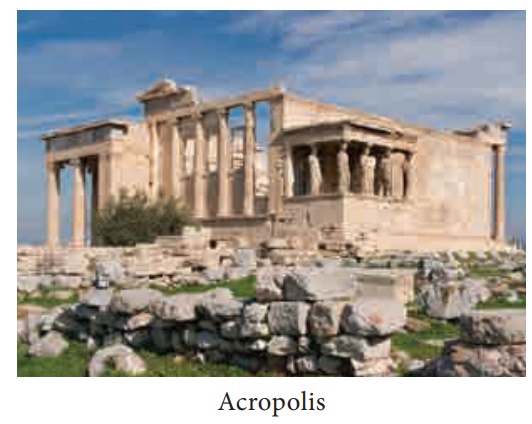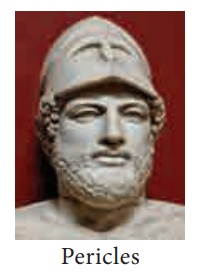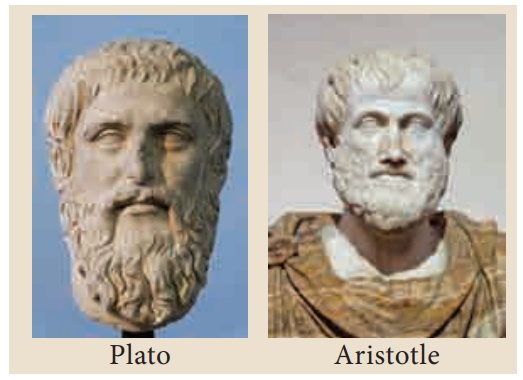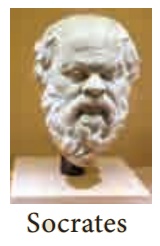The Classical World | History - Greece: The Hellenic World | 9th Social Science : History: The Classical World
Chapter: 9th Social Science : History: The Classical World
Greece: The Hellenic World
Greece: The Hellenic
World
Until 8th century BC
(BCE) Greece was not different from the rest of the world. People were
illiterate, craft specialization was primitive, and life was difficult. With
the exception of Sparta, agriculture was limited by the mountainous terrain.
However, the Greeks succeeded in founding colonies along the coast that helped
them earn revenue through trade. As a result by the 6th century BC (BCE),
Greece turned into a network of City-States. Acropolis, a fortified city
of ancient Greeks on a hill in Athens, is an illustrative example of their
advancement. Though the City-States fought each other they were bound together
by trade, by a common alphabet, similar religious practices, and festivals. The
illustrious example for the last one was the Olympic festival of sports and
games.

Greeks’ Victory over Persians
King Darius (BC (BCE)
550–486), who was heading a great empire in Persia, decided to conquer the
Greek City-States. The first Persian attack on Greece failed. This was due to
the fact that Persian army suffered from disease and lack of food during its
march. Therefore, in planning the second attack, the Persians avoided the land
route and came by sea. The Greeks or Hellenes, fought patriotically and defeated
the Persian army at Marathon in 490 BC (BCE). Xerxes, King Darius’ successor
conducted another expedition. Joined by Spartans this time, the Athenians
persisted in their resistance and in the final battle fought in Salamis,
Persian ships were destroyed. Disheartened Xerxes returned to Persia without
achieving his end.
“Democracy” in Hellenic Greece
When the Greek City-
States first emerged, they still carried the legacy of the past. The rulers
came from lines of traditional chieftains. Those who grew rich from the
expansion of trade resented the privileges enjoyed by the old ruling families.
The outcome was the overthrow of the kings and the establishment of
“oligarchies” in many city-states. Under Oligarchy, the new rich exploited the
smaller landholders. So this republic was soon replaced by some ambitious men
who administered tyrannically. Yet the Age of Tyrants 6th century to 4th
century BC (BCE) proved to be a period of urban development, with new buildings
and enormous temples such as Olympian Zeus at Athens.
Athenian Democracy
In Athens, the pressure
from below resulted in the replacement of both oligarchy and tyranny by
“democracy.” The law-making power in Athens was vested in an assembly open to
all freemen.
Judges and lower
officials were chosen by lots. This arrangement was resented by the upper
classes who considered democracy to be the rule of the mob.![]()
![]()
![]()
![]()
The Persian danger had
united the Greeks. When this danger was removed, they started quarrelling
again. The history of many Greek city-states was one of continual struggles by
the rich landowners against “democracy”. The only exception was Athens, where
“democracy’ survived for about 200 years.
Pericles (461–429 BC (BCE)
Athens had a great
leader, Pericles, who held power for thirty years. During his rule, Athens
and Sparta were continuously at war with each other. This war is
known as the Peloponnesian War. Pericles Athens, despite hostility and
disturbance from Sparta, became a noble city with magnificent buildings. There
were great artists and great thinkers. Historians therefore call this the Age
of Pericles. Herodotus, the historian, and his successor
Thucydides, lived about this time.


The thinkers of the
Pericles era sought to find a new objective basis for arriving at truth. The
greatest of them was Socrates. As a philosopher, he discussed difficult
problems with his friends so that truth might emerge out of the discussions.
Plato was his illustrious disciple. Plato argued that truth must depend on a
realm outside human experience, accessible only to philosophic elite.
Aristotle, studying under Plato, laid stress on the empirical knowledge of the
existing physical and social world. Democritus and Epicurus developed a
materialist view of the world.

Beginnings of Hellenistic Civilization
The Greek city-states
did not have an elaborate bureaucracy. They were therefore able to show a greater
dynamism. Under Alexander the Great, the Greeks were able to establish a
kingdom in Macedonia. This kingdom succeeded in annexing two historic empires
of Egypt and the Middle East. But the entire period of Alexander’s reign was
spent on wars.
Greek- Egyptian city of Alexandria. Euclid who formulated the basic theorems of geometry, Eratosthenes who accurately calculated the diameter of the earth, and Hipparchus, the founder of trigonometry were all products of this age. Ptolemy built on Hipparchus’s ideas and later developed a model of motion of the planets and stars.
Related Topics